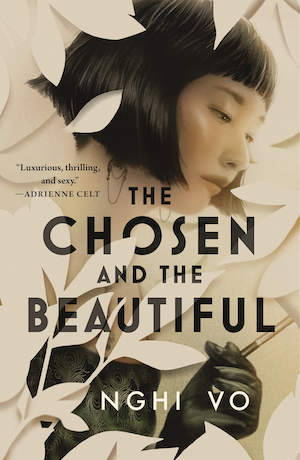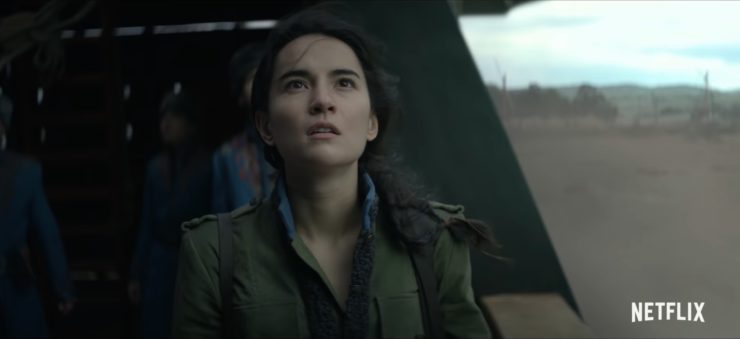Bringing a beloved book series to the screen is the biggest thing in television right now, especially with genre fiction. But it can be challenging to walk the line of pleasing both longtime fans and brand new viewers, to bring the best of the source material to life in a new format while also allowing it to be fresh and new.
Shadow and Bone, based on Leigh Bardugo’s Grisha Trilogy as well as the other stories set in the universe of a fantasy alt-Russia, manages to do this quite well, and to be visually beautiful to boot, although it makes a few missteps along the way.
Shadow and Bone opens beautifully, dropping us into a new world by literally showing us a map, which being drawn by our protagonist, Alina Starkov. Alina (Jessie Mei Li) is a mapmaker with the first army of Ravka, and the map she is drawing shows a swath of darkness cutting her country in two. When Alina and her best friend Malyen Oretsev (Archie Renaux) are later attacked by the monsters that dwell in this dark place, called the Fold, Alina discovers that she possesses a power that until now has only been a myth—the ability to summon light. Summarily whisked off to the capital, Alina has to struggle to find her place among the Grisha, people with the ability to control elements, bodies, or material, and beside the darkly enigmatic General Kirigan (Ben Barnes) who summons darkness. The war-ravaged country of Ravka has long dreamed that a Sun Summoner would come to tear down the Fold and save the country… as long as assassins and kidnappers don’t get to her first.
Buy the Book


The Chosen and the Beautiful
It’s an exciting, if familiar, opening, which is unfortunately edited into short bursts interspersed with a second plot line featuring a set of roguish characters (from the Six of Crows Duology) who are scheming to get a job sneaking across the Fold to kidnap the new Sun Summoner. Although the characters—ruthless and brooding Kaz Brekker (Freddy Carter), the strong and spiritual Inej Ghafa (Amita Suman) and the all-too-charming sharp shooter Jesper Fahey (Kit Young)—are fantastic and very well acted, the quick cut editing for the first two or three episodes makes it hard for the audience to settle into either plotline, and the number of names and places dropped by Kaz and Inej in their early conversations are impossible to follow even if you have read the books.
But the show begins to find its feet, and its pacing, somewhere near the end of episode three, and in the meantime, viewers can enjoy the incredible set dressing and lovely costumes. Then the plotlines begin to coalesce and the stakes become clearer, allowing the audience to finally connect with the characters and understand the world much better.
Jessie Mei Li has the hardest job in Shadow and Bone; Alina is young and inexperienced, and in most of her scenes she is either panicked, frustrated, or lost. But she is also the lynch-pin around whom the entire story turns, and Li does an excellent job maintaining a sense of solidity and strength within Alina regardless of how out of her depth the character may be feeling. Alina’s romantic interest in Kirigan comes off as innocent without seeming childish, and whenever the script gets a chance to give Alina the chance to be sarcastic or snarky, Li nails it every time. Watching her performance, you can see that there is a lot to Alina just under the surface, waiting to blossom out of her like the light she can summon at command.
Alina is also biracial, and looks like her mother who was from the country that borders Ravka to the south. Racism towards these people, the Shu Han, is something Alina faces regularly; she’s kicked out of the army chow line by someone who doesn’t want to serve a Shu Han, people question her identity as a Ravkan, and she even witnesses as performance in which a blond white actress portrays the Sun Summoner fighting off monsters in the fold. This narrative (which didn’t exist in the books) adds a new theme of loneliness and otherness to Alina’s journey, and enriches her connection to the other outsiders she meets. Despite her being elevated to a position of status, and potentially even great power, we never lose our sense of Alina as belonging to the common people of Ravka, and that through line also serves to anchor her eventual connection with Kaz, Jesper, and Inej, even though the only have a few scenes together.
Li has great chemistry both with Barnes and with Renaux, whose Mal walks the line between childish exuberance and courageous stoicism in a way that is utterly charming. And there is a wonderful balance between them where they take turns being the serious one and the silly one, the wounded one and the protector. It’s easy to see why they are drawn to each other.
The plotline with Kaz, Jesper, and Inej has more levity to it than Alina’s, with schemes and heists, disguises, and excellent fight scenes. Jesper is a particular joy, and Kit Young plays his tenderhearted rogue to perfection. Those who are unfamiliar with the trio might find Kaz a bit hard to connect to, but the deep relationships between the three give you a reason to care about him all the same.
The biggest flaw of Shadow and Bone is that it is too busy. The interplay of the different plotlines is interesting, but in only eight episodes there isn’t nearly enough time to give either side its due, and the third plotline of Nina and Matthais seems an entirely pointless diversion from the regular action. Most of the scenes between Alina and the other Grisha, Alina and her trainers, and even Alina and General Kirigan feel almost perfunctory; we don’t really get to watch her build these relationships, or spend much time with her learning to use her powers. Fans of the books will recognize some of the most important conversations in Shadow and Bone reduced to a few soundbites that fail to capture any depth or nuance.
But when the show does slow down for Alina, when it gives her a moment to breathe, it works very well. The voiceovers of her letters to Mal, and his to her, capture more of who she is as a character, and the flashbacks allow us to spend time with her as a little girl (both actors portraying young Alina and Mal are fantastic in the roles) and to come to love her. And most exciting of all is the way we are left in the last episode, with the promise not only of more story, but more growth and depth from the characters, nuance to the themes, and of greater adventures to come.
Sylas K Barrett is a fantasy enthusiast, currently writing Reading the Wheel of Time here on Tor.com. You can also find his reread of the Grisha Trilogy here.










